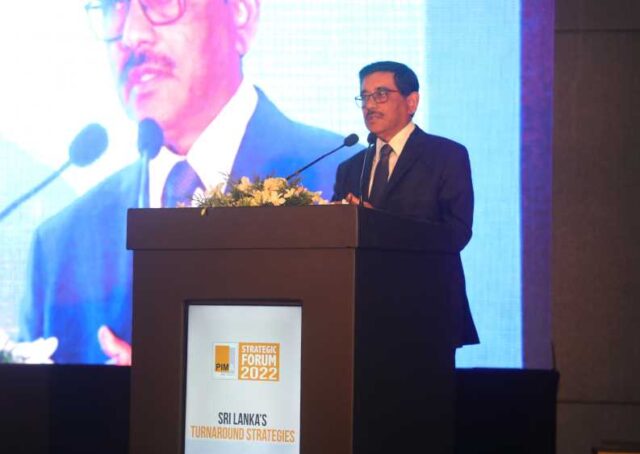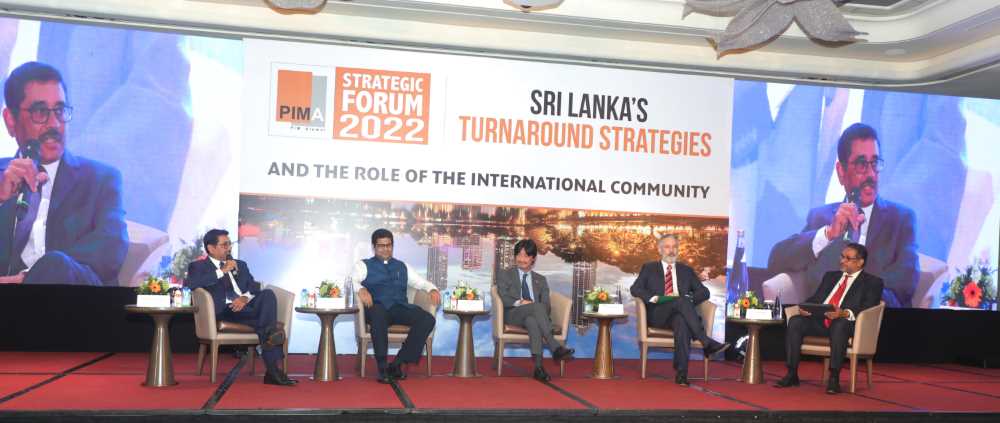At the recently held strategic forum titled ‘Sri Lanka’s turnaround strategies and the role of the international community’ that was hosted by the Postgraduate Institute of Management Alumni ( PIMA) , it’s Keynote speaker the Governor of the Central Bank Sri Lanka Dr. Nandalal Weerasinghe said, they are now preparing a turnaround strategy required to bring the country back to even keel.
Stating that the IMF has found that our debt is not serviceable and the requests made by the IMF for the debts to be restructured, steps are being taken to meet these requirements Weerasinghe said. “The four-year turn around facility we have agreed upon with the IMF will entail a number of policy and structural reforms” he added.
The Sri Lanka-IMF program targets a positive 2.3% primary deficit by 2025 as against 6% negative figure in 2021.Forecast of primary deficit for 2022 is a negative 4%. CBSL Chief stated that in order to achieve this ambitious target sharp adjustments will have to take place and will involve painful pro-cesses such as taxes being raised. With the increase in the essentials, the low-income and fixed-income earners will be badly affected and we will have to have take measures to protect the vulnera-ble.

“Our bilateral creditors and others will have to grant us the required financial assurances prior to the IMF lending us any money. This will demonstrate to all concerned parties that this process is done transparently so that all terms offered are known to all, “Wicremasinghe emphasized.
Sri Lanka is looking to restructure about US $ 29 billion, out of which International Sovereign Bonds (ISBs) account for US $ 19 billion.
While expressing his confidence in reaching a deal with the creditors and stabilizing the economy, Weerasinghe said, the importance of policy changes on matters such as Money laundering and other financial crime will have to be addressed according to the requirement of the IMF. In their request Anti-corruption measures take a prominent place which is among the primarily necessary amendments to be carried out. The anti-corruption law has been discussed in parliament, and accountability and credibility with this in place it could be foreseen then it would encourage enhanced investment he said.
Responding to the night’s topic the panelists Embassy of Japan, Dep. Head of Mission, Katsuki Kitaro said, “ as the 2nd largest partner in the IMF, we can play a constructive role in assisting Sri Lanka on the proposal submitted by Sri Lanka for approval. We have been helping the pharmaceutical sector and in other assist the most vulnerable of people in Sri Lanka now. Additionally, the other two area’s that would generate the most foreign exchange is tourism and employment.”
Further he added that if a stable situation is achieved, within the next 15-20 years Sri Lanka can be regional hub. Because it close to southeast Asia, Bay of Bengal, India and the east coast of Africa. If this can be achieved Japan will continue to stand strongly next to you Kitaro said.
Deputy Chief of Mission U S Embassy, Douglas E. Sonnek addressing the gathering stated, “the US will remain a friend and partner to Sri Lanka. The economic recovery is going to need tough decisions timely action and real fortitude. Some decisions won’t be popular. The US is committed to playing a positive role. As the largest participant in the private bond market we are looking forward to working constructively. Comparable and transparent treatment of debt is important in reaching a quick and important solution. As the countries with the independent constitution are the ones that will make the most progress Sonnek said.
Deputy High Commissioner of India, Vinod K Jacob sharing his views said, “India totally supports SriLanka. The line of credit, the Foreign Exchange snapshot, currency swaps, humanitarian assistance, medical assistance and development partnership. India kept the borders open to the people of Sri Lanka as long as possible”.
The overall take was that this comprehensive and coherent approach to achieving and maintaining public debt sustainability is a must to take in addressing the current economic problem.




